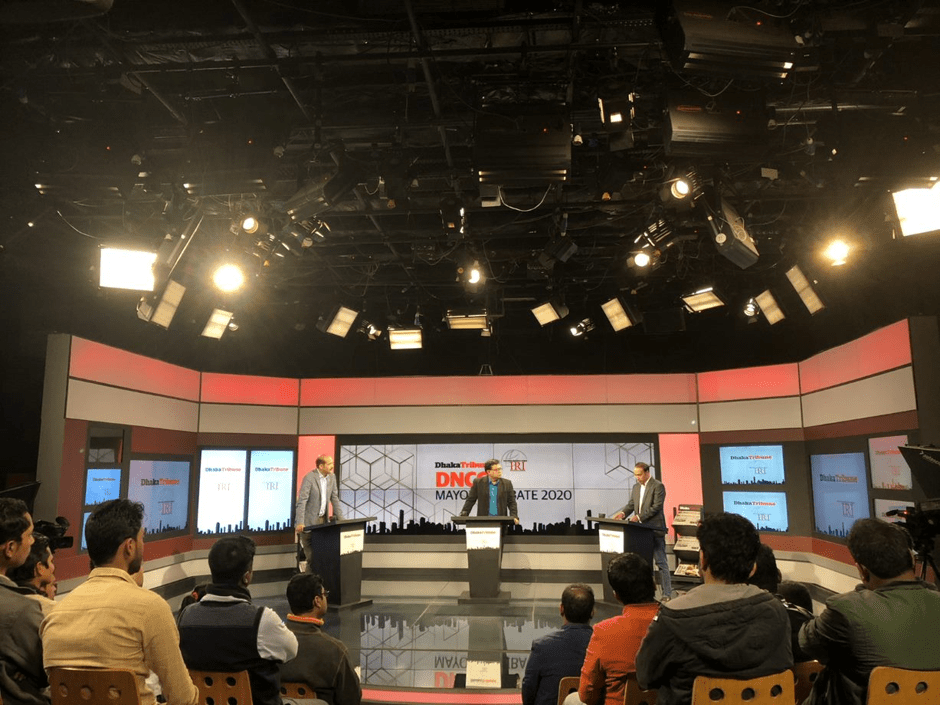
Democracy thrives when voters are informed and engaged in a dialogue with their elected representatives. With this goal in mind, in January 2020 the International Republican Institute (IRI) partnered with the Dhaka Tribune and Channel 24 to host nationally televised debates in Bangladesh ahead of their mayoral elections—giving constituents a rare opportunity to engage with candidates and seek answers to their most pressing concerns.
On February 1, Bangladesh’s capital city Dhaka held mayoral elections, with Dhaka’s 5.4 million registered voters divided into two administrative zones: Dhaka North and Dhaka South, each of which elects its own mayor. Although the vibrant one-month campaign period featured placards, speeches, television appearances and other types of promotion, no candidate debates were scheduled. Understanding the importance of debates to encouraging competition and challenging political parties to create the most issue-based and responsive platforms possible, IRI stepped in to help our partners fill that gap.
Partnering with Dhaka Tribune, a leading English language newspaper, and Channel 24, IRI co-sponsored a nationally televised candidate debate for both Dhaka North and Dhaka South. The candidates from the leading parties — the Awami League (AL), the governing party; the Bangladesh National Party (BNP), the primary opposition party; and Jatiya Party (JP), the official opposition in the parliament — participated in the debates, which were aired a few days before Election Day.
Nearly 800,000 people watched the debates online or on television, and clips and statements from the debates were covered by the media. Both debates were informative, impactful and filled with heated but respectful arguments. Furthermore, party leadership responded to the needs and priorities of their constituents—the first step in creating a government that is representative of the people.
The candidates shared their proposals on important issues facing Dhaka, as identified by the public, and challenged each other’s policy visions. Among the key problems discussed were air pollution, traffic congestion, mosquito-borne diseases, improving parks and playgrounds, bureaucratic coordination and drug abuse.
For example, the BNP’s Dhaka North candidate Tabith Awal argued that creating better schools across the city would reduce traffic by lowering the number of students traveling long distances to attend a quality school. To improve government responsiveness, the AL’s Dhaka South candidate Sheikh Fazle Noor Taposh proposed that one day every week should be designated as an “…Open day when any citizen can come and meet the mayor directly to file a complaint and get results.”
The debates allowed voters to compare the candidates’ positions and make their decisions based on the issues. Shohidul Islam, a resident of Dhaka South, said, “I had some negative perceptions regarding a candidate which were cleared after watching him in the debate. I am so impressed with his logic and approach towards the opposition and his plan for the city.” Another voter, Reshma Begum, said, “We suffered during the candidates’ day-long promotional songs and rallies, but the debate is a much better way to watch their constructive discussions and arguments under one umbrella.”
Dhaka’s residents can now hold its two mayors accountable for the promises they made during the debates and on the campaign trail. IRI’s co-sponsored debates gave voters an opportunity to compare the candidates’ agendas, personal demeanour and ability to defend their positions against critique. The Institute looks forward to continuing to work with our partners on the ground to strengthen Bangladesh’s democracy by closing the gap between politicians and their constituents.
Top